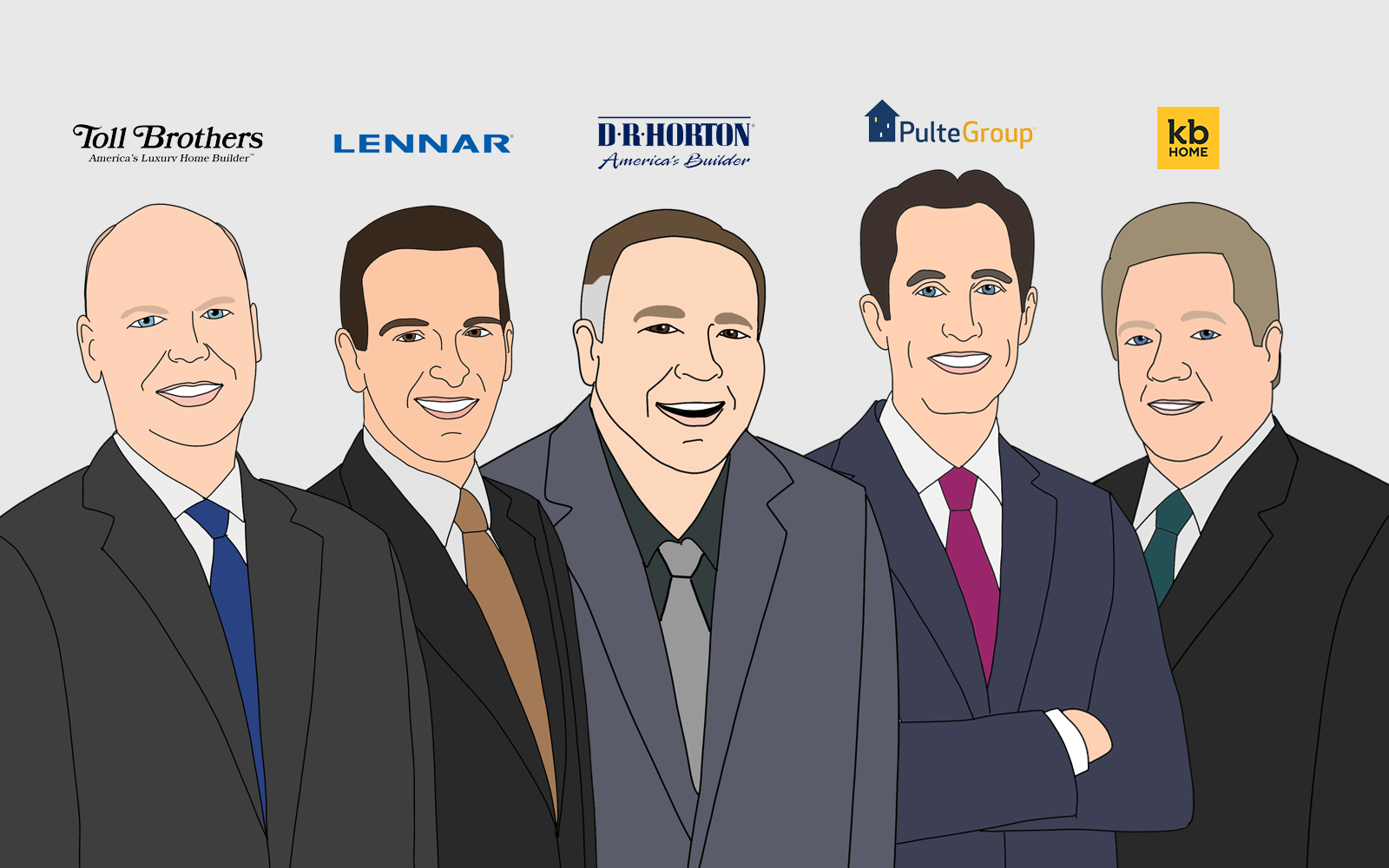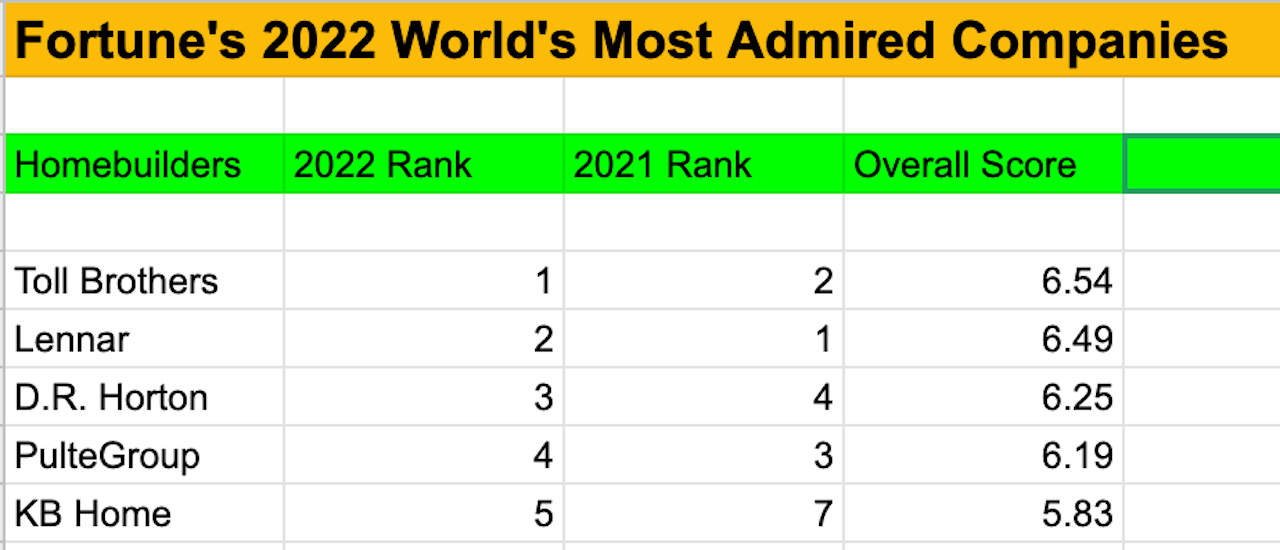Leadership
Fortune Smiles on Toll, Lennar, Horton, PulteGroup, KB Home
Winning honors in Fortune's 2022 World's Most Admired Companies rankings, five homebuilding enterprises reflect both the good news and the intensifying challenges ahead.

Among 333 globally-known companies from 11 different business sectors and a subgroup of 52 industries, Toll Brothers, Lennar, D.R. Horton, PulteGroup, and KB Home landed coveted spots on Fortune's 2022 rankings of its World's Most Admired Companies.

What the distinction means, particularly now, and why it matters in ways that sweep across the business culture and community of residential real estate and housing deserve close attention.
The gist of the Fortune annual scorecard – the result of a poll partner Korn Ferry conducted among 3,700 executives – is corporate reputation, not heft.
What makes for reputation? Here are the nine measures of "regard" the survey weighs into its rankings:
- Innovation
- People Management
- Use of Corporate Assets
- Social Responsibility
- Quality of Management
- Financial Soundness
- Long-Term Investment Value
- Quality of Products/Services
- Global Competitiveness
Across these criteria – through the survey's lens of responding executives, directors, and analysts within each respective industry – critical business cultural factors that boil down to sustainable success through upcycles and down stand out. As Fortune staffers Matthew Heimer and Scott DeCarlo note:
The Most Admired Companies list aims to quantify the reputations of the world’s biggest businesses. But dig a little deeper—see our methodology—and you’ll realize that Fortune’s rankings actually capture two versions of each company’s reputation. The All-Stars list ranks companies by the esteem they command from the wider business community. Our individual industry rankings show the standing each one holds among leaders in its own industry—the folks who compete with it every day.
The Take-Aways
Recognition awards and rankings such as Fortune's Most-Admired and Best Companies and Best Companies to Work For do not typically figure into core goals, business plans, strategies, principles, mission, and purpose. Companies want to be good, and do well, they don't specifically work to win awards or recognition.
Still, the job these scorecards serve is important to the people who work not just at the five homebuilding companies Fortune's poll spotlights, but the broader industry of homebuilders, and the even broader sector of shelter, and its ecosystem of competitors, rivals, partners, entrepreneurs, and enterprises.
That's because this moment – characterized by the pandemic, by exponential technological advance, by generational rotation, and by upheaval in the future of livelihoods, in what is beyond question a valued-experience-driven economy – is a business cultural cauldron that will stress test fitness in all its forms.
It is a moment that will find infinitely, constantly evolving ways that award deep capability and punish the lack of it as too fragile to survive.
Here's why now – as powerful constructive and favorable forces and growing opportunities stack up against an equally potent raft of challenges, uncertainties, and headwinds – taking a hard look at how a business, large or small, scores in those nine specific criteria is critical. Fortune and Korn Ferry's benchmarks of corporate reputation and regard nest within them the kind of blend of tangible and intangible essentials most business leaders could agree will rank as consequential determiners of success.
Context
When you consider the five companies that earned mention among Fortune's 333 "Most-Admired," a few things pop out, although not necessarily in this order.
- There are just five homebuilders in the list despite residential development and construction's outsized broader economic impact.
- Among the Top 50 "All Star" firms, Insurance, Property & Casualty player Berkshire Hathaway and specialty retailers Home Depot and Lowe's are the housing and construction firmament's only three brands whose esteem level spread beyond their own industry to the entire respondent base.
- Big technology firms dominate the Top 10 in the list – Apple, Amazon, Microsoft, Alphabet – as their both their business benchmark performance cycles and their cultures of attraction of generation after generation of human talent give them an almost unfair advantage versus other sectors.
Broadly, regard among peers, partners, analysts, "frenemies," bitter rivals, executive team members, etc. might work as one of the better proxies for the kind of culture of capability that embodies not simply the necessities of operational excellence and a strong product value proposition, but the trusted relationship capital that can make good things happen even as circumstances and conditions evolve or erupt.
Why it matters
In the backdrop of the broad range of organizations, two clear strategic bedrock imperatives challenge leaders of homebuilding companies – small, medium, and large, irrespective of geography, housing type, or price point – and their networks of partners.
- One is that a firm needs to be good both as a builder, and above-and-beyond that as a company. People who lead, manage, supervise, and operate homebuilding firms need to strive not only to be "the best builder," but to be a good companies in the sense of being all about finding and making customers.
- The other is recognition among builders of who and what they are and who they want to be. Sparking and building that relationship with a buyer client who is making the most consequential financial decision of a lifetime suggests that in their nature homebuilders are intellectual property developers every bit as much as they are real property developers.
That the Fortune Most-Admired rankings include five organizations reflects both a reason to celebrate and a stark warning to heed. The future of reputation, of being the best place to work, of revenue rankings, and of business success itself comes down to an area homebuilding stands out for as a big, bright red flag.
America’s hold over top talent is under threat at a time when top talent is growing ever more important. Silicon Valley has famously applied the “10X” rule to programmers: The best programmers are 10 times more productive than the merely average programmers. Now, with the advance of technology, the “10X” rule is turning into the “100X rule.” Marc Andreessen, the venture capitalist and founder of Netscape, claims that “the gap between what a highly productive person can do and what an average person can do is getting bigger and bigger. Five great programmers can completely outperform 1,000 mediocre programmers.”
So as we tip our hats to the leaders and team members of Toll Brothers, Lennar, D.R. Horton, PulteGroup, and KB Home for having what it takes to get here, we challenge all homebuilders, their land developer, investor, lender, architecture, product manufacturer, distributor, data services, and other partners to commit to learn what it will take to get "there."
America needs to start thinking about “talent” differently, not as a problem that can be solved but as a supply chain that needs to be sustained. Just as car companies think in terms of years when planning their supply of car parts rather than rely on the spot market, so America needs to think in terms of decades when considering its supply of people."
No talent, no reputation, no success. It's that simple.
Join the conversation
MORE IN Leadership
10 Bold Ideas Tackling Housing Affordability And Access Now
From AI to hempcrete, these 10 ideas show how innovation in design, finance, and policy can open the door to housing affordability.
Sumitomo Forestry Sharpens U.S. Focus With DRB Move
Strategic clarity replaces portfolio sprawl as Sumitomo bets big on U.S. scale and integration.
Homebuilders and Insurance: A New-Reality Cost To Stay Ahead
Exclusive insights from Westwood Insurance Agency’s Alan Umaly and MSI’s Naimish Patel reveal why homebuilders must rethink insurance, resilience, and risk management—or risk losing buyers in an increasingly volatile market.
